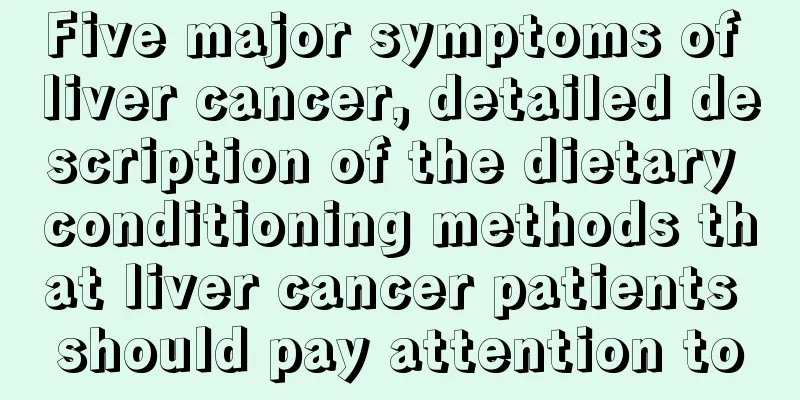Five major symptoms of liver cancer, detailed description of the dietary conditioning methods that liver cancer patients should pay attention to

|
As the number of patients with liver disease increases, the number of patients with liver cancer also increases. Liver cancer has now become our second most common cancer, second only to lung cancer. This cancer often manifests as weight loss, fatigue, and severe pain. Once you are sick, the chance of recovery is small, so you should pay attention to your life and stay away from liver disease and liver cancer. Five symptoms of liver cancer 1. Weight loss and fatigue This symptom often occurs in the middle and late stages of liver cancer. It may be that tumor metabolites cause changes in the body's biochemical metabolism, reduced food intake, and cachexia in severe cases. 2. Fever The fever caused by liver cancer is generally around 37.5'C~38℃, occasionally reaching above 39℃, with irregular fever pattern, often without chills. Fever is more common in the afternoon, and sometimes remittent high fever can also be seen. Fever can be caused by tumor necrosis or its metabolites. 3. Digestive tract symptoms Common symptoms include decreased appetite, upper abdominal fullness after meals, or even nausea, vomiting or diarrhea. 4. Pain This is a common symptom in patients with liver cancer. The pain is generally located in the liver area. The liver pain in patients with middle and late stage liver cancer is generally located in the right rib or under the xiphoid process. The nature of the pain is mostly persistent dull pain, dull pain or stabbing pain. A small number of patients may also have special manifestations of pain. Patients with liver cancer may also have referred pain in other parts of the body. The pain area of some patients is located in the upper and middle abdomen, which is mostly caused by left lobe liver cancer, but is sometimes misdiagnosed as stomach disease and delayed treatment. Some patients may experience right shoulder pain, which is clinically more common in tumors in the right lobe close to the diaphragm, because it involves the diaphragm and causes referred pain in the right shoulder, which is easily misdiagnosed as periarthritis of the shoulder. Dietary conditioning methods for patients with liver cancer 1. Eat soft food that is easy to digest, avoid hard and spicy food, eat less fried food, and eat small and frequent meals. Avoid irritating food and food with high plant fiber content, so as not to cause rupture and bleeding of esophageal or gastric veins in patients with liver cirrhosis. This is one of the dietary points for liver cancer patients. 2. Eat a diversified diet and pay attention to the combination of foods to ensure that they are colorful, fragrant and tasty, so as to increase appetite. This is also the key point of the diet for liver cancer patients. 3. Eat more fresh vegetables and fruits, drink fruit juice and supplement vitamins. 4. Provide high-protein, high-calorie, high-vitamin, low-fat food. Limit the intake of animal oil. 5. Patients with fever should drink more water to help dissipate heat. 6. For patients with ascites, sodium intake should be restricted and a low-salt or salt-free diet should be given. 7. People who vomit frequently should temporarily fast to prevent food from irritating the stomach, increasing the frequency of vomiting, and wasting physical strength. These are the key points of dietary conditioning for liver cancer patients. Five dietary taboos for liver cancer 1. Moldy food: Aflatoxin in moldy food is a liver cancer-causing substance. The shortest time it takes to cause cancer is only 24 weeks. Therefore, food should be properly stored and discarded immediately once it is moldy, especially soybeans, peanuts, sweet potatoes, sugar cane, etc., which must not be eaten. In addition, peanut oil should not be stored for a long time. If it is found to have a rancid smell, it should not be eaten. Otherwise, it will not only taste bad, but more importantly, it will cause cancer. 2. Pickles: Pickles, pickles, salted fish and other pickles are refreshing and appetizing. As the weather gets hotter, people lose their appetite and prefer to eat pickles with rice. However, pickles contain a large amount of nitrosamines, which have been shown to be related to liver cancer. It is best not to eat them or eat less. And remember, you must pickle them thoroughly before eating. 3. Drinking: Long-term drinking will cause alcohol to digest the gastric mucosa. Once the gastric cells are injured, the toxic substances in the food will be easily absorbed by the stomach, which can easily cause alcoholic hepatitis, damage the liver's detoxification function, and even cause alcoholic cirrhosis, which is a risk factor for liver cancer. If moldy peanuts are used as a snack, the possibility of inducing liver cancer will be greater. Dr. Dong recommends that adult men should not drink more than 2 cups of alcohol per day, and women should not drink more than 1 cup. 4. Spoiled animal and vegetable oils: Stale oils contain the chemical component malondialdehyde, which can generate polymers and react with proteins and DNA in the human body, causing the protein structure to mutate, causing the cells with mutated proteins to lose their normal functions and transform into early cancer cells. In addition, malondialdehyde polymers can hinder the replication of DNA and accelerate the aging process of people. Therefore, animal and vegetable oils should not be stored for too long, and oils that have deteriorated and have a rancid smell should not be eaten. Foods fried with rancid oils not only taste bad, but more importantly, they can cause cancer and shorten people's lifespan. 5. Spicy food: People with liver cancer should be careful not to eat spicy and irritating food, because it will cause great stimulation to the body. Because patients with primary liver cancer are prone to portal vein cancer thrombus, causing portal hypertension, esophageal and gastric varices, once the diet is improper, it may cause upper gastrointestinal bleeding in patients, endangering their lives. In addition, we also want to remind everyone: patients with primary liver cancer must pay attention to food hygiene. Unclean food can cause intestinal infection, which may eventually induce serious complications that endanger life. |
<<: What are the early symptoms of male lung cancer? 4 clinical symptoms of early male lung cancer
Recommend
Can you sleep? 9 bedtime habits that affect sleep quality
Most people experience some type of sleep problem...
Can white wine remove acne
Everyone knows that white wine has bactericidal a...
The efficacy and function of Amomum villosum
Amomum villosum, also known as Western Amomum vil...
What to do if you have pain in late stage liver cancer?
Patients with advanced hepatocellular carcinoma w...
How to cure toothache instantly
I believe that many people have one or two friend...
What can a barium meal test reveal?
Barium meal is mainly used in barium meal radiogr...
What are the symptoms of rectal cancer?
Rectal cancer may be asymptomatic in the early st...
What are the consequences of not treating scabies?
Scabies is a very serious skin inflammation cause...
What are the clinical symptoms of gallbladder cancer
Cancer is one of the most serious diseases in our...
What to do if you are stung by a wasp
Whether it was when we were kids or the kids toda...
Is Glycated Hemoglobin the same as blood sugar? The difference between glycosylated hemoglobin and blood sugar
Blood sugar refers to the monosaccharide in the b...
What's wrong with the red spots on my feet?
Many people have the problem of red spots on thei...
Tips for preventing heatstroke during the “dog days”
I believe everyone has some knowledge about the d...
How many days will it take to remove the thyroid cancer drainage tube
The thyroid cancer drainage tube is usually remov...
Stifling the invisible killer that causes lung cancer starts with prevention
Lung cancer is currently the "number one kil...









